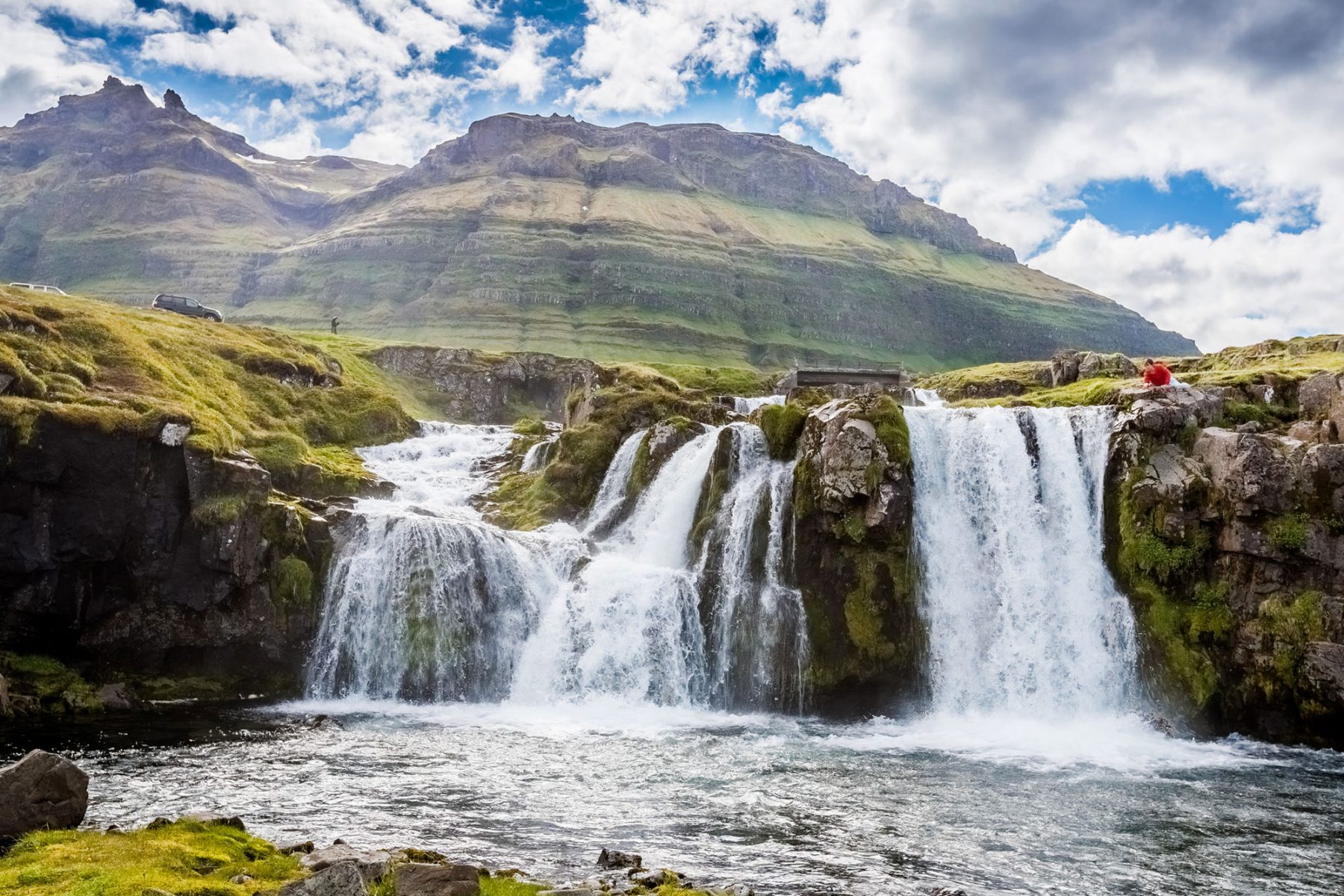
Iceland FAQs
With so much to see and do in Iceland, many of our clients come to us as first-time travellers wanting to know when and how to make the very best of their time on the island. Having been captivated by this extraordinary country for nearly four decades we love sharing our knowledge and providing holiday suggestions.
Below is a selection of our most popular queries, answered by our team of Iceland Travel Specialists.
Iceland is a year round destination. The best time to travel depends largely on what you want to see or do. Generally speaking, visitors drawn by the prospect of seeing the northern lights should travel between September and April. However, if long days appeal then visit between late May and the end of July when you can experience the almost perpetual light of the midnight sun. July and August are the busiest months, although Iceland is big enough to avoid the crowds and there are many options for getting off the beaten track and discovering quieter areas of the country. The ‘shoulder season’ months of May and September are, in our opinion, fantastic times to visit, especially for self-drives, taking advantage of the good weather and competitive hotel rates. May and June are two of the best months for bird watching, especially if you are keen to see puffins, while mid-June to August is prime season for wildflowers. If you want to explore the uninhabited interior of Iceland, you should plan your visit for July and August as most of the highland 4WD tracks are only open during this period. Iceland is an extremely rewarding destination for whale watching – a must-do for first-time visitors. You can see minke, humpback and even blue whales during summer (May to September) in North and West Iceland. Incredible encounters with pods of orca are possible during the winter months of February to March when they come close inshore to feed on herring along the Snaefellsnes Peninsula in West Iceland. Dolphins, porpoises and seabirds are highlights of whale-watching tours at any time of year, while winter trips have the added potential bonus of northern lights sightings. Read our season by season guide on the best time to visit Iceland
Iceland is a year round destination. The best time to travel depends largely on what you want to see or do. Generally speaking, visitors drawn by the prospect of seeing the northern lights should travel between September and April. However, if long days appeal then visit between late May and the end of July when you can experience the almost perpetual light of the midnight sun.
July and August are the busiest months, although Iceland is big enough to avoid the crowds and there are many options for getting off the beaten track and discovering quieter areas of the country. The ‘shoulder season’ months of May and September are, in our opinion, fantastic times to visit, especially for self-drives, taking advantage of the good weather and competitive hotel rates. May and June are two of the best months for bird watching, especially if you are keen to see puffins, while mid-June to August is prime season for wildflowers. If you want to explore the uninhabited interior of Iceland, you should plan your visit for July and August as most of the highland 4WD tracks are only open during this period.
Iceland is an extremely rewarding destination for whale watching – a must-do for first-time visitors. You can see minke, humpback and even blue whales during summer (May to September) in North and West Iceland. Incredible encounters with pods of orca are possible during the winter months of February to March when they come close inshore to feed on herring along the Snaefellsnes Peninsula in West Iceland. Dolphins, porpoises and seabirds are highlights of whale-watching tours at any time of year, while winter trips have the added potential bonus of northern lights sightings.
Read our season by season guide on the best time to visit Iceland
From spotting whales to soaking in the Blue Lagoon, chasing the aurora borealis to basking under the midnight sun – Iceland is a mesmerising and unique place. For lovers of the great outdoors, it offers some of Europe’s best hiking trails along with activities such as snowmobiling, horse riding and superjeep safaris. For those in search of a quirky city destination Reykjavik is buzzing with galleries, restauarants, bars and museums – and should be on everyone’s bucket list for a New Year celebration. Not to be missed – especially for first-time visitors – the iconic Golden Circle includes Geysir’s seething hot springs, the ‘Golden Falls’ at Gullfoss and historic Thingvellir National Park (a world heritage site encompassing both the ancient Icelandic parliament and the tectonic rift between Eurasian and North American plates). Keen photographers will be captivated by Iceland’s dramatic scenery and ever-changing light, while birdwatchers can track down puffins, eider ducks and a myriad other seabirds. Few visitors, meanwhile, leave Iceland without falling under the spell of its extraordinary volcanic landscapes. Whether you’re travelling solo, with friends or family, we can create holidays to suit your every requirement. For further inspiration see our top ten things to do in Iceland or browse our collection of Iceland holidays or contact our Travel Specialists to tailor make your ideal itinerary.
From spotting whales to soaking in the Blue Lagoon, chasing the aurora borealis to basking under the midnight sun – Iceland is a mesmerising and unique place.
For lovers of the great outdoors, it offers some of Europe’s best hiking trails along with activities such as snowmobiling, horse riding and superjeep safaris. For those in search of a quirky city destination Reykjavik is buzzing with galleries, restauarants, bars and museums – and should be on everyone’s bucket list for a New Year celebration. Not to be missed – especially for first-time visitors – the iconic Golden Circle includes Geysir’s seething hot springs, the ‘Golden Falls’ at Gullfoss and historic Thingvellir National Park (a world heritage site encompassing both the ancient Icelandic parliament and the tectonic rift between Eurasian and North American plates). Keen photographers will be captivated by Iceland’s dramatic scenery and ever-changing light, while birdwatchers can track down puffins, eider ducks and a myriad other seabirds. Few visitors, meanwhile, leave Iceland without falling under the spell of its extraordinary volcanic landscapes.
Whether you’re travelling solo, with friends or family, we can create holidays to suit your every requirement. For further inspiration see our top ten things to do in Iceland or browse our collection of Iceland holidays or contact our Travel Specialists to tailor make your ideal itinerary.
Although Iceland has a reputation for being an expensive country to visit, you can expect to pay only a little more than prices in London. Over the last few years Iceland has been experiencing bumper numbers of visitors and its appeal continues to increase. However, with capacity being limited, the term ‘book early to avoid disappointment’ has never been more pertinent! For an idea of daily costs, see our quick guide to how much things cost in Iceland.
Although Iceland has a reputation for being an expensive country to visit, you can expect to pay only a little more than prices in London. Over the last few years Iceland has been experiencing bumper numbers of visitors and its appeal continues to increase. However, with capacity being limited, the term ‘book early to avoid disappointment’ has never been more pertinent!
For an idea of daily costs, see our quick guide to how much things cost in Iceland.
Iceland is one of the best places in the world to view the northern lights. It is possible to see them between September and mid-April. The aurora borealis appears when solar wind particles collide with air molecules in the earth’s atmosphere, transferring their energy into light. Displays can vary in intensity (and duration), though the swirling curtains of glowing green, yellow and crimson arching overhead is always magical. A clear cloudless night in almost any countryside location is ideal, but light cloud and even moonlight can help to create interesting displays. The most important thing to remember is that you need to stay in a location away from artificial light pollution. Don’t be tempted by cheap ‘northern lights city breaks’ in Reykjavik. We offer aurora-watching holidays in the countryside that are not only more special and memorable, but greatly boost your chances of seeing the aurora borealis. Our favourite rural locations for northern lights viewing include Hotel Ranga, and Hotel Husafell. Remember that displays cannot be guaranteed even if conditions seem perfect. If you’d like a festive break in Iceland’s lively capital, we’d recommend a two-centre itinerary combining a stay in Reykjavik with time in rural Iceland to maximise your chances of seeing the aurora.
Iceland is one of the best places in the world to view the northern lights. It is possible to see them between September and mid-April. The aurora borealis appears when solar wind particles collide with air molecules in the earth’s atmosphere, transferring their energy into light. Displays can vary in intensity (and duration), though the swirling curtains of glowing green, yellow and crimson arching overhead is always magical. A clear cloudless night in almost any countryside location is ideal, but light cloud and even moonlight can help to create interesting displays.
The most important thing to remember is that you need to stay in a location away from artificial light pollution. Don’t be tempted by cheap ‘northern lights city breaks’ in Reykjavik. We offer aurora-watching holidays in the countryside that are not only more special and memorable, but greatly boost your chances of seeing the aurora borealis. Our favourite rural locations for northern lights viewing include Hotel Ranga, and Hotel Husafell. Remember that displays cannot be guaranteed even if conditions seem perfect. If you’d like a festive break in Iceland’s lively capital, we’d recommend a two-centre itinerary combining a stay in Reykjavik with time in rural Iceland to maximise your chances of seeing the aurora.
Iceland experiences 24-hour daylight from around late May to mid-July. However, in order to witness the best of the midnight sun, aim to get as far north as possible (parts of North Iceland are just a few kilometres below the Arctic Circle) and time your visit to coincide with the summer solstice around 21 June. The merging of sunset and sunrise during mid-summer creates a magical few hours for photography, while the long days of an Icelandic summer are perfect for hiking. Experience the midnight sun for yourself taking advantage of the long days on our Summer Nights at Ranga self-drive holiday.
Iceland experiences 24-hour daylight from around late May to mid-July. However, in order to witness the best of the midnight sun, aim to get as far north as possible (parts of North Iceland are just a few kilometres below the Arctic Circle) and time your visit to coincide with the summer solstice around 21 June. The merging of sunset and sunrise during mid-summer creates a magical few hours for photography, while the long days of an Icelandic summer are perfect for hiking.
Experience the midnight sun for yourself taking advantage of the long days on our Summer Nights at Ranga self-drive holiday.

Warmed by the Gulf Stream, winter temperatures are surprisingly similar to those of Vienna or Milan, while in summer they are usually in the range of 10-16°C (lower in the highlands). The weather in Iceland can be changeable and most visitors can expect a mixture of sunny and cloudy conditions as well as rain and wind, sometimes in a single day. In winter, snow comes and goes, and from around October to April (inclusive) a 4WD vehicle is the best option for self drive holidays. Alternatively, consider joining an expertly guided small group tour. For more about the weather see our dedicated best time to visit Iceland page.
Warmed by the Gulf Stream, winter temperatures are surprisingly similar to those of Vienna or Milan, while in summer they are usually in the range of 10-16°C (lower in the highlands). The weather in Iceland can be changeable and most visitors can expect a mixture of sunny and cloudy conditions as well as rain and wind, sometimes in a single day. In winter, snow comes and goes, and from around October to April (inclusive) a 4WD vehicle is the best option for self drive holidays. Alternatively, consider joining an expertly guided small group tour.
For more about the weather see our dedicated best time to visit Iceland page.
For a summer visit touring by coach or car, comfortable and casual clothing in layers is best. Include a good quality breathable wind and rainproof jacket and trousers, a light and thick sweater or fleece jacket, sunglasses, a hat and neck gaiter or scarf as well as sturdy walking shoes or boots. Hikers should pack thermal underwear. For campers, a three-season sleeping bag is advisable. For winter visits, warm over-trousers and a thick jacket or coat are essential. Don’t forget to bring swimwear and a towel for the many naturally heated bathing pools and outdoor hot tubs at many hotels. After booking your holiday with us, you will receive a Travel Tips booklet full of advice on what clothing and other items to take, as well as notes on photography, local information and much more.
For a summer visit touring by coach or car, comfortable and casual clothing in layers is best. Include a good quality breathable wind and rainproof jacket and trousers, a light and thick sweater or fleece jacket, sunglasses, a hat and neck gaiter or scarf as well as sturdy walking shoes or boots. Hikers should pack thermal underwear. For campers, a three-season sleeping bag is advisable. For winter visits, warm over-trousers and a thick jacket or coat are essential. Don’t forget to bring swimwear and a towel for the many naturally heated bathing pools and outdoor hot tubs at many hotels.
After booking your holiday with us, you will receive a Travel Tips booklet full of advice on what clothing and other items to take, as well as notes on photography, local information and much more.

It depends on how you enjoy travelling. Exploring Iceland on a self-drive holiday gives you freedom to travel at a pace that suits you. Simply pick up your car or motorhome at Keflavik airport and you’re free to go – visiting famous sites and exploring some of the country’s hidden gems. We also offer a range of escorted tours – ideal if you’d like to join a small group of like-minded travellers and experience the very best of the country with the help of an expert guide. With a choice of classic touring or luxury 4WD itineraries you can explore Iceland’s spectacular landscapes in a style that suits you.
It depends on how you enjoy travelling. Exploring Iceland on a self-drive holiday gives you freedom to travel at a pace that suits you. Simply pick up your car or motorhome at Keflavik airport and you’re free to go – visiting famous sites and exploring some of the country’s hidden gems.
We also offer a range of escorted tours – ideal if you’d like to join a small group of like-minded travellers and experience the very best of the country with the help of an expert guide. With a choice of classic touring or luxury 4WD itineraries you can explore Iceland’s spectacular landscapes in a style that suits you.
We have been creating holidays to Iceland for over 39 years and are the world’s leading specialist tour operator to this captivating mid-Atlantic island. Our wealth of expert knowledge and first-hand experience is what makes us stand out from other travel companies, so when it comes to helping you plan your ideal Iceland holiday – you know you’re in safe hands.
If you’d like to find out more about Iceland, please contact our friendly team of travel specialists direct or make an enquiry online.



 Instagram
Instagram
 Facebook
Facebook
 YouTube
YouTube